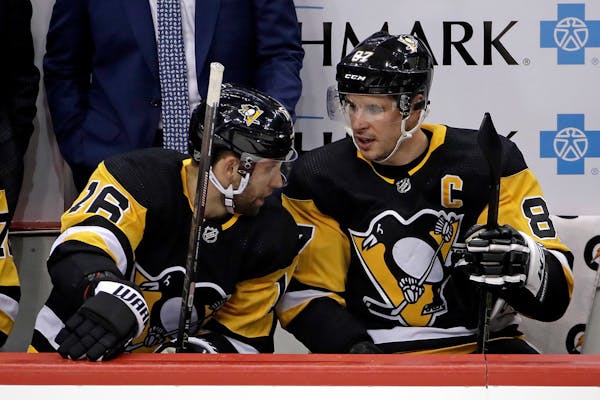 See
more of the story
See
more of the story
The questions were as predictable as precipitation.
Do you worry about the feelings of the player you traded? Do you worry about the guys who remain in the locker room? How could anyone survive such a horrific life as that of a professional hockey player, what with eight months of work a year and the high taxes on the multimillion dollar salaries?
After the Wild traded Jason Zucker to Pittsburgh, General Manager Bill Guerin explained the move and coach Bruce Boudreau explained the ramifications. In an attempt to sound sensitive to all of the various feelings of all the various parties, both offered the proper platitudes about how tough it must be to get traded.
I don't think they meant it.
Here are the things they said Tuesday morning that I think they meant:
Guerin: "We got exactly what we wanted. . . . It's part of the life that we signed up for. . . . I can promise you this: If there is quit [in the Wild], there will be more trades."
Boudreau: "You can't tuck them in at night and say, 'Everything's OK.' We're all professionals. . . . Every time I moved on, it was just a new adventure and I didn't worry about it."
Zucker will be fine. He's made at least $18 million playing hockey and is due another $16 million or so. He signed up to be a hockey player, and hockey players get traded, especially when they sign big contracts and then play poorly.
If Zucker doesn't like his lot in life, he can retire, count his money and coach high school hockey, where he will not be counting much more money.
Let's put sympathy aside. Zucker underperformed, and the Wild made a good deal, for winger Alex Galchenyuk, defense prospect Calen Addison and a first-round draft pick. Zucker's old teammates were so broken up by his departure that they dominated from the first minute in a 4-0 victory over Las Vegas on Tuesday night.
The Penguins get a speedy winger who might surge when playing with better centers. The Wild gets a talented 19-year-old defenseman who might one day captain their power play, a first-round pick that could be important, and a player who is just as talented as Zucker.
Last season, Zucker scored 42 points, Galchenyuk 41. Both have reached the 30-goal plateau once.
Zucker is a superior player right now. But Galchenyuk is worth a look for a team that lacks scoring, and if he doesn't persuade the Wild to re-sign him, Minnesota will have valuable cap space with which to pursue centers and perhaps a goalie.
Guerin spent most of his first six months on the job distinguishing himself from predecessor Paul Fenton as a human. Fenton was a cranky autocrat. Guerin displays charisma and affability.
This marked Guerin's first test, and he more than passed. All trades bear risk, and Zucker could make him look bad by playing like a star for the rest of the season and the playoffs, but that wasn't going to happen for Zucker in Minnesota.
Guerin cleared cap space, acquired a talented future defenseman and a first-round pick and cleared cap space.
Fenton favored ''hockey trades'' — one player for one player. And he did well to bring in Kevin Fiala for Mikael Granlund. Fiala is the best reason to watch the Wild these days. He's already one of the most gifted scorers in franchise history.
Fenton could have gotten more in that deal, and Guerin seems to understand that every deal he makes has to make more sense for the future than the present.
Guerin handles himself like a pro. He threatened his current team without raising his voice. Yes, there probably will be more trades, and the current Wild players can ensure there will be deals if they don't play like professionals.
Given the state of the franchise the past two years, there should probably be more deals even if they do play like professionals.
The way the Wild played in their first game without Zucker, Guerin should now trade for Zucker, so he can trade him away again.
Jim Souhan's podcast can be heard at TalkNorth.com. On Twitter: @SouhanStrib. • jsouhan@startribune.com






